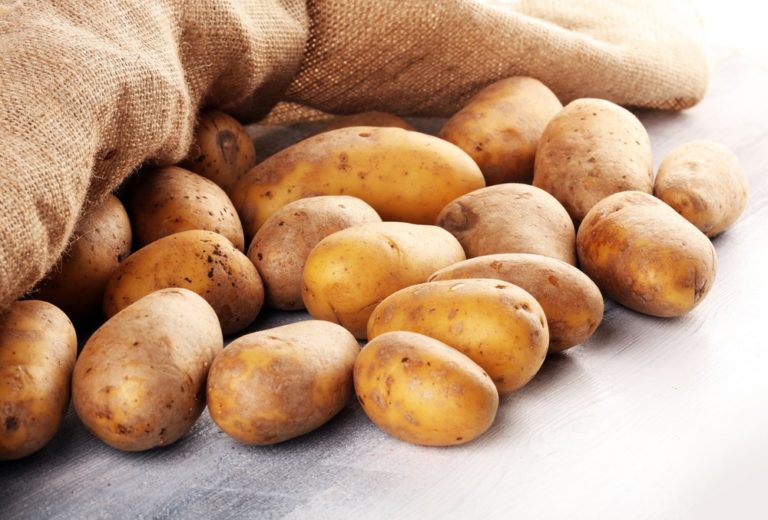You’re digging your teeth into a succulent yummy morsel of potato. Your dog inches ever so close and gawks at you with melting eyes, eyes that melt your heart and make you purr with an outstretched potato in your hand. But say a dog nutritionist was close by, what would they say if you asked them this question: Can I give potatoes to my dog?
The expert answer is that dogs can eat potatoes in moderate amounts, but the preparation method also determines how safe they’ll be for your dog. For instance, while cooked potatoes are relatively safe, raw potatoes can cause a choking hazard, or worse, poisoning from a substance called solanine.
That’s why in this article, we’ve detailed what you need to know about potatoes and dogs, such as the health benefits of potatoes, the dangers of too many potatoes in a dog’s meal, why raw potatoes are harmful to dogs, whether or not dogs can eat mashed potatoes, potato peels or chips, what to do when a dog eats potato peels, and how to prepare a safe potato meal for your dog.
What Are The Health Benefits Of Potatoes To Dogs?
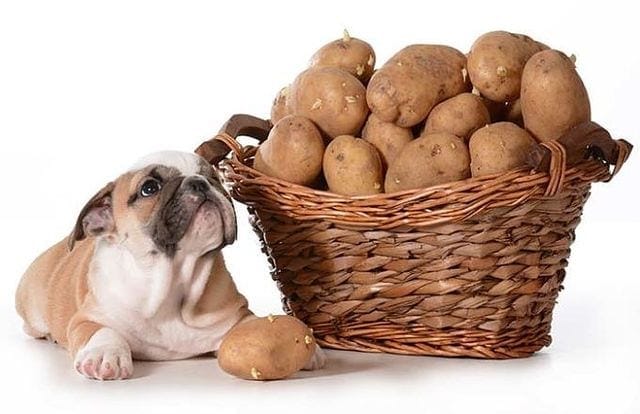
Potatoes, like other plant foods, have nutritional contents that are highly beneficial to dogs. Some of them are:
Contains Antioxidants
Potatoes contain antioxidants like flavonoids and anthocyanins that inhibit the growth of cancer cells, especially in the kidney and liver. In addition, the antioxidants in potatoes reduce the duplication and negate the effect of free radicals responsible for causing cancer in your doggie’s body.
Contains Rich Nutrients And Vitamins
The major nutritional benefits of potatoes come from the numerous types of vitamins housed within the tuber. One powerful vitamin worth mentioning is vitamin C which is famous for boosting dogs’ immune systems and counteracting the effect of bacteria that causes urinary tract infection in the bladder walls.
The presence of potassium, which combats hyperkalemia— muscle weakness and low energy in dogs, is another key reason potatoes are helpful to dogs.
Aids Digestion
Fiber is the grease that smoothens the wheels of the digestive engine in your canine’s body, and potatoes pack quite a lot of it. When dogs ingest fiber contained in potatoes, they experience a quicker and better digestive process which helps in optimum metabolism and speedy removal of toxins that would otherwise have remained longer in your doggie’s system.
Stabilizes Blood Sugar Level
The glycemic index in potatoes is low, which helps in the steady and measured release of sugar into a dog’s bloodstream.
This act of slow-release provides a perfect blood sugar balance because the body system has ample time to adapt to the measured sugar additions in the bloodstream.
Fast Filling
Potatoes have a dense texture, thus making them deliver a heavy impact on dogs’ stomachs, ultimately reducing the hunger rate in dogs.
When your four-legged buddy eats foods like potatoes that rapidly fill the stomach, the urge to consume more food reduces. When that happens, the battle against obesity in an overweight dog starts to become achievable.
Contains Resistant Starch
Potatoes contain resistant starch-rich in short-chain fatty acids that strengthen beneficial bacteria in dogs’ large intestines. When good bacteria in the gut are strengthened, the absorption of food nutrients quickens by several notches and boosts the overall productivity of your dear Fido’s system.
Butyrate, a substance found in short-chain fatty acids that are present in potatoes, also enters the liver and enhances the activation of enzymes that help break down and expel toxins in dogs.
What Are The Dangers Of Feeding Potatoes To Dog?
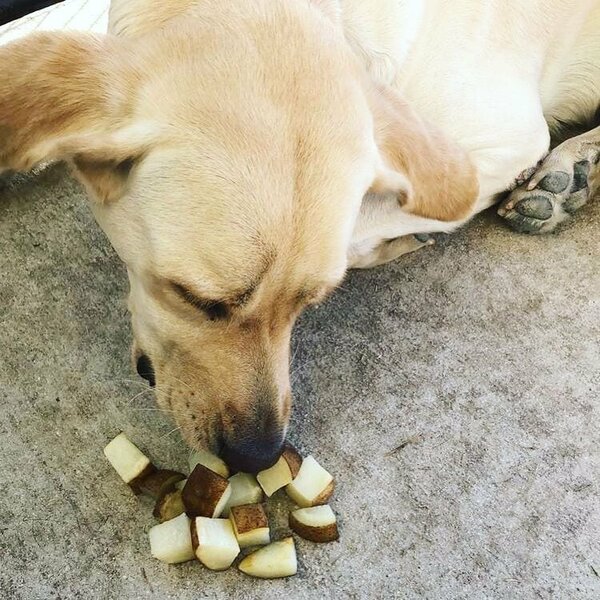
Despite the benefits of potatoes, they can still be dangerous when fed to dogs the wrong way. Below are some of the harmful effects of potatoes on a dog’s system:
Salt Toxicity
Toxicity from potatoes happens when dog owners feed their pooches with mashed or cooked potatoes that’s been seasoned with salt. Unfortunately, even in small amounts, salt destroys cells within a dog’s body, leading to a broad range of life-threatening symptoms such as vomiting, excessive thirst, seizures, coma, etc.
Obesity
Potatoes are safe for dogs to eat without trouble so long as they undergo a boiling process, but the same can’t be said for sweet potatoes. This highly sweet potato variant contains more calories and will create problems for dogs breeds like the Labrador Retriever that carry a genetically mutated obesity-inducing gene.
Consequently, dog parents with aged dogs and those with underlying health issues should take extra care with the number of sweet potatoes made available as dog food.
Kidney Stones
Sweet potato peels have incredibly high amounts of oxalates which bind with calcium to form crystal stones that harden and accumulate in the kidney. The occurrence of crystals limits the kidney’s ability to flush out liquid toxins to the bladder.
What’s more, oftentimes, when your canine consumes potato peels repeatedly, oxalate compounds not only form crystals in the kidney, they solidify in the bladder and block the urinary tract.
The signs of bladder and kidney stones are painful urination, little or no urine for extended periods, and urinary tract infections.
Can Dogs Eat Mashed Potatoes?
In their original, unadulterated form, mashed potatoes are a delightful and universally acceptable meal for all dogs. However, the problem with mashed potatoes prepared in homes is the addition of ingredients like butter and milk that constitute problems for your furry buddy.
Butter and milk are dairy products that activate the symptoms of lactose intolerance in dogs. These ingredients contain calories that lead to weight gain, thereby causing more harm than good.
Furthermore, gravies spread on and eaten with mashed potatoes contain spices and food ingredients like onions and garlic that cause severe stomach discomfort in dogs.
Apart from the onions and garlic, the sodium content in gravies further worsens a dog’s case after consuming a meal of mashed potatoes.
Incidentally, since it’s a common custom to serve gravy alongside mashed potatoes, amateur dog parents might unknowingly endanger their furry friends when they make the meal available.
This is also partly why Kentucky Fried Chicken (KFC) and other fast food mashed potatoes are a no-no for your doggie.
Conclusively, if dogs must eat mashed potatoes, then the best option is homemade mashed potatoes.
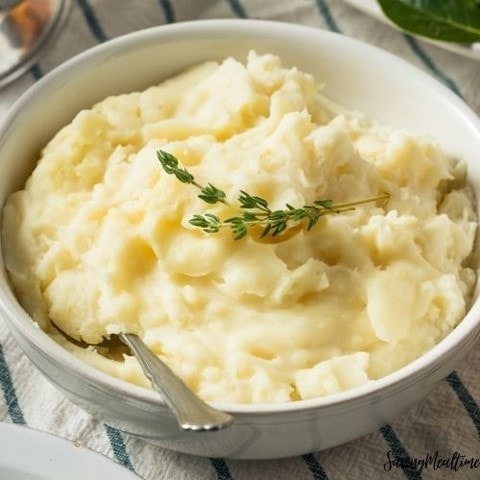
How Do I Prepare Homemade Mashed Potatoes For Dogs?
Homemade mashed potatoes are better for your dear Fido because it contains nothing but freshly cooked potatoes. Should anything be added, since you’re in charge of the preparation, you can guarantee what goes into the meal.
To prepare homemade mashed potatoes, take out one or two tubers of sweet potato, scrub with a sponge and boil on a stove. Depending on the size of your canine, you could increase the number accordingly.
After 8 to 10 minutes, take it off the stove. But poke a knife or fork through the potatoes to make sure they are very soft. Next, peel off the harmful skin with a knife and dissect the potatoes into smaller pieces.
Finally, mash with a wooden spoon and add water to make a smooth and even consistency. Preferably, you could add some yogurt and minced meat to make it more enjoyable.
Can Dogs Eat Potato Chips?
Regarding other cooking methods of potatoes, frying comes to mind. Ideally, dogs shouldn’t have potato chips because of cholesterol accumulation from the consumption of fried food like chips.
Also, since chips are usually salted, peppered, and packaged with preservatives, many health implications may arise when you allow your beloved furry pal to consume potato chips.
In a nutshell, if you must give chips as treats, then ensure that it’s free of seasonings that irritate your pooch’s digestive system.
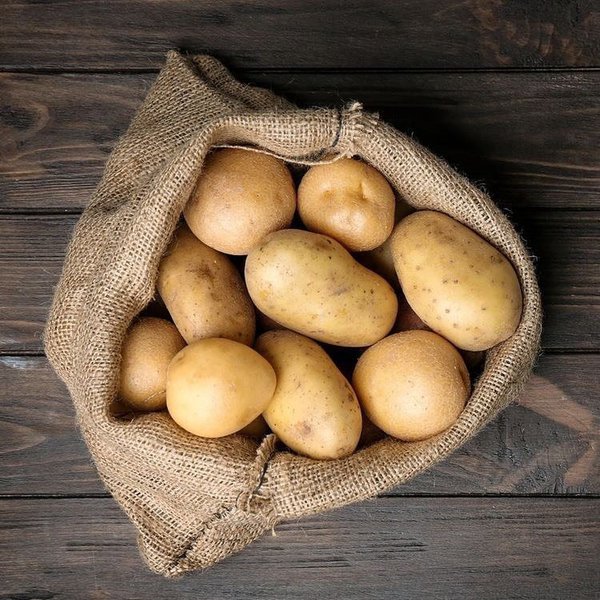
Can Dogs Eat Raw Potatoes?
Dogs shouldn’t eat raw potatoes because it contains a harmful toxin called solanine that disrupts proper nerve function and hampers cell functionality throughout a dog’s body.
Solanine, also known as green potato poisoning, is present in green potatoes and causes a dog to exhibit symptoms such as loss of consciousness, incoordination, muscle weakness, and etc.
Another reason why dogs mustn’t eat raw potatoes is to avoid the possibility of a choking hazard. Naturally, raw potato is hard and difficult to chew, so your doggie could have a rough lump of potato stuck in its throat.
Also, the jagged edges of a raw potato might cause difficulty in swallowing and, sometimes, a painful sore feeling in a dog’s throat.
Can Dogs Eat Potato Skin?
No, dogs shouldn’t eat potato skin because it contains a dangerous toxin called solanine that affects brain functionality and muscle coordination.
Although a considerable amount of potato skin is needed to render a dog hospitalized, there’s a high likelihood that a dog can suffer from solanine poisoning, especially when your pooch wades through the trash bag and feasts on a handful of peels.
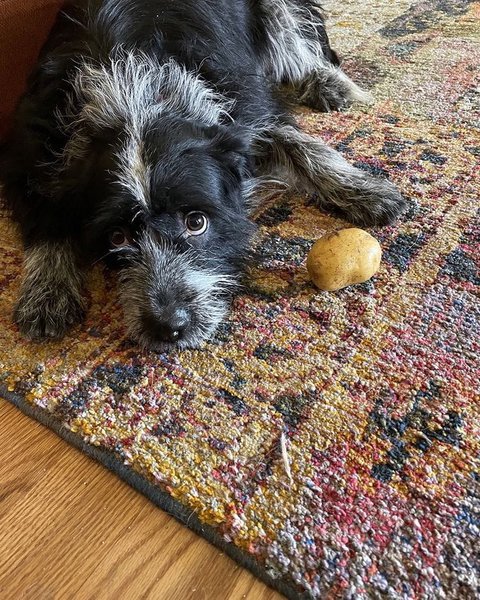
What To Do If My Dog Eat Potato Peels?
One or two ingested slices of potato peels shouldn’t cause any disturbance in dogs. But if your pooch goes into the trash and devours lots of potato skins, calling the vet is the next appropriate step to take.
The vet may require you to use hydrogen peroxide to induce vomiting as a quick home remedy.
Depending on the amount vomited compared to what was ingested, your veterinarian may further proceed to insert a tube down your dog’s throat to flush the remaining toxin out with water.
In the absence of fatality, recovery ensues and will depend on the extent of damage suffered, your dog’s age, and its previous health status.

